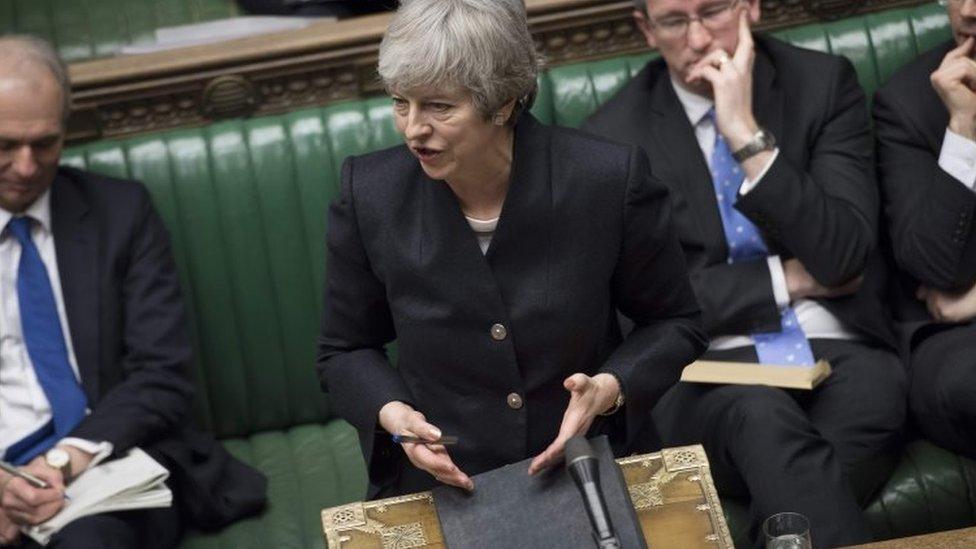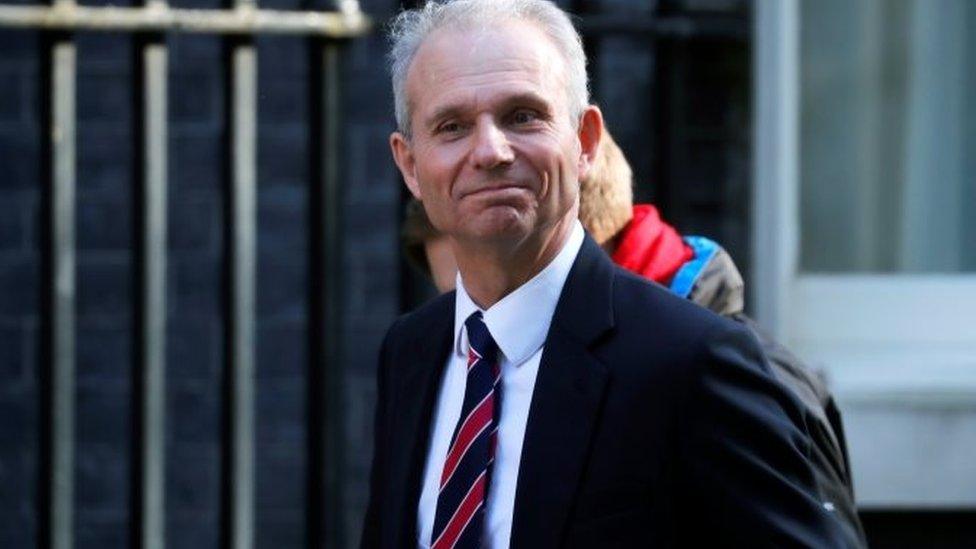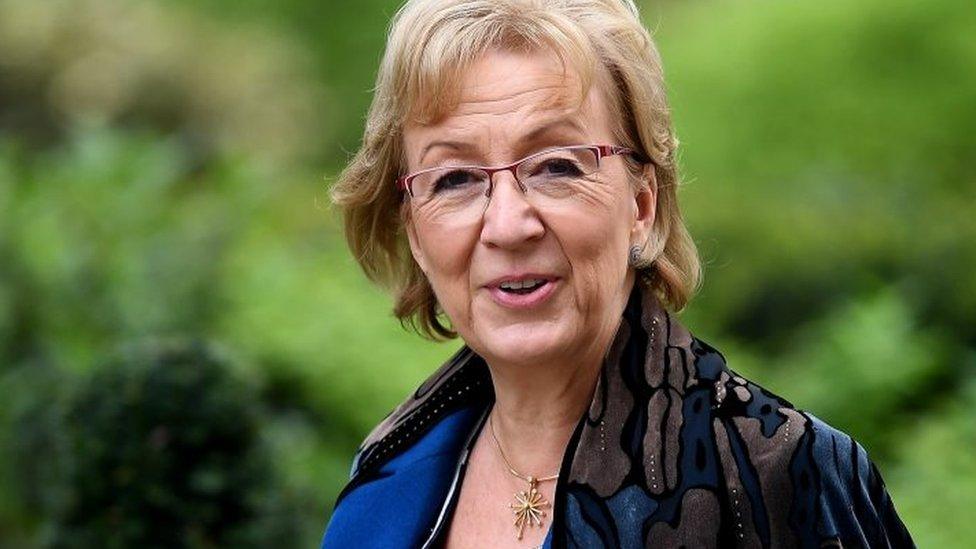Week ahead in Parliament
- Published
- comments

As Parliament reconvenes after its Easter recess, there will be great and tragic events to respond to.
MPs will hear statements on the Sri Lanka bombings and the murder of Lyra McKee in Northern Ireland, as well as a response to the climate change demonstrations which will surround Westminster as they return.
But, otherwise, this is one of those parliamentary weeks when the serious political action takes place offstage - with a prime minister under siege, important local elections approaching, and the eruption of the new Brexit Party sending quivers through the established contenders.
So watch out for parliamentary theatre around those issues - Conservative backbenchers attacking or defending their leader, possibly in code, possibly in the open, alternative leaders preening and posturing, and the different Labour Brexit factions jockeying for position. Enjoy.
Oh and keep an eye on the signature count on the Labour MP Stephen Doughty's Early Day Motion opposing any invitation for President Trump to give a joint address to the Houses of Parliament, during his forthcoming state visit.
Tuesday 23 April
First business as MPs resume operations (14:30 BST) will be justice questions - to be followed by ministerial statements on the Sri Lanka bombings, the murder of the journalist Lyra McKee (it's billed as "Northern Ireland Update") and on climate change policy.

MPs will hear a statement on the murder of Lyra McKee in Northern Ireland
The day's main business is a series of statutory instruments (SIs).
The first of these is the Northern Ireland (Extension of period for Executive Formation) Regulations 2019, which will extend the period in which Northern Ireland Ministers can be appointed following the Northern Ireland Assembly election on 2 March 2017 from 26 March 2019 to 25 August 2019.
This is important because once the period for Executive formation ends, the Northern Ireland Secretary will be required to propose a date for a new assembly election.
This order, in effect, postpones that moment until after 25 August 2019 - reflecting the continuing political deadlock in Northern Ireland.
That is followed by three Brexit-related SIs:
The Value Added Tax (Tour Operators) (Amendment) (EU Exit) Regulations 2019
The Electronic Communications (Amendment Etc.) (EU Exit) Regulations 2019
The Animal Health and the Seed Potatoes and Food (Amendment) (Northern Ireland) (EU Exit) Regulations 2019
The day's debates in Westminster Hall open (11:30) with discussion of the Expert Working Group report on hormone pregnancy tests (HPTs), looking at the implications of the latest review of the evidence on the safety of hormone pregnancy tests, from November 2018.
This concluded that that "the use of oral HPTs in pregnancy is associated with increased risks of congenital malformations".
Later debates include discussion of proportional representation in the House of Commons (16:30) and plastics recycling (18:30).
On the committee corridor, the Science and Technology Committee (13:00) hears evidence on technologies for meeting clean growth emission reduction targets from scientific experts and then from Energy Minister Claire Perry.
Environmental Audit kicks off its new inquiry into toxic chemicals (13:45) with evidence about the business department's failure to publish the results of several reviews into chemical regulation.
And the new Digital, Culture, Media and Sport Sub-Committee on disinformation begins its work, with evidence from Information Commissioner Elizabeth Denham and James Dipple-Johnstone, deputy commissioner (operations) at the Information Commissioner's Office.
The House of Lords is not sitting.
Wednesday 24 April
The Commons meets at 11:30 for half an hour of questions to David Lidington, the de facto deputy prime minister, before the prime minister takes to the dispatch box at noon for Prime Minister's Question Time.

David Lidington, the de facto deputy prime minister, will take questions from MPs on Wednesday
Both may provide an opportunity for Brexiteers to express their fury at the latest postponement of exit day and the prospect of European Parliament elections on 23 May.
For once, the theatre here could be very significant.
The day's Ten Minute Rule Bill, from the Conservative, Richard Graham, proposes a review to consider imposing a levy on gambling industry profits to provide protections for vulnerable people at risk of being harmed by gambling.
Then a relative rarity, a Labour Opposition Day Debate, which is expected to be a pre-local election discussion of the impact of austerity and spending cuts on local councils and the services they provide.
The adjournment debate, led by Birmingham Labour MP Richard Burden, is on the closure of GKN Aerospace in his constituency - an important defence contractor.
In Westminster Hall, debates include:
Russian annexation of Crimea (9:30)
Pension credit changes (11:00)
Ten years of the work capability assessment in relation to employment support allowance and universal credit (14:30)
My committee pick is the Work and Pensions session (9:30) on "No DSS" - discrimination against benefit claimants in the housing sector. There will be evidence from landlords, tenants, Shelter, banks and building societies, estate agencies and housing associations.
In the Lords, peers too are back from their Easter break (15:00).
Questions to ministers include the Conservative Lord Robathan asking about UK participation in the European parliamentary elections (and not, I imagine in an approving way).
Then peers turn to Commons amendments to the Mental Capacity (Amendment) Bill - where the main remaining issue revolves around the legal definition of a deprivation of liberty.
After that, peers will be asked to approve the Relationships Education, Relationships and Sex Education and Health Education (England) Regulations 2019.
From September 2020, schools will be required to teach all primary pupils relationships education and all secondary pupils relationships and sex education.
This will cover issues like internet safety and unhealthy relationships and ensure pupils are taught in an age-appropriate way about respectful and healthy relationships, including friendships and family relationships - and crucially, it removes the right of parents to withdraw their children from sex education, after the age of 16.
Then the House debates the residential construction sector, modern methods of construction, and the steps being taken to boost the housing supply.
Thursday 25 April
The Commons opens (9:30) with half an hour of International Trade Questions, followed by Women and Equalities Questions, and Business Questions to the Leader of the House Andrea Leadsom.

There will be the regular Business Questions to the Leader of the House Andrea Leadsom
The main debates are on two cross-party motions selected by the Backbench Business Committee - first on school funding, complaining about the increasing financial pressure on schools (the sponsors include the former children's minister Tim Loughton and former shadow education secretary Lucy Powell).
Then there is a motion calling for the government to issue new guidance on Restrictive Intervention of Children and Young People (ie physical restraint, as well as restrictions on liberty and freedom of movement).
Lib Dem former health minister Norman Lamb, Conservative MP Anne-Marie Trevelyan and Labour's Helen Hayes are among the backers.
In the Lords (11:00) the main business is debates on two select committee reports:
The Communications Committee report: "UK advertising in a digital age"
The European Union Committee report: "Brexit: food prices and availability"